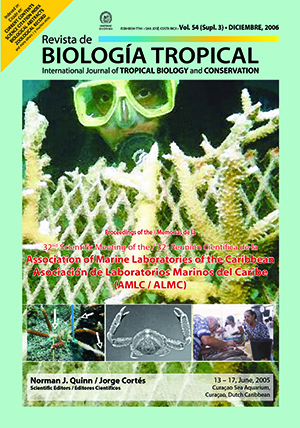Abstract
The Atlantic and Gulf Rapid Reef Assessment (AGRRA) Program, consisting of non-fixed, transectbased visual surveys, provides “snapshot” characterizations of a number of structurally or functionally important benthic and fish indicators on tropical northwestern Atlantic (TNWA) coral reefs and Brazil. To ameliorate the confounding factors inherent in multiyear temporal variation, a region-wide collaborative program for conducting rapid reef assessments at regular (five-year) intervals in sites that are representative of each sub-region of the TNWA is proposed. Member institutions of the Association of Marine Laboratories of the Caribbean (AMLC) and individual colleagues are invited to join in developing the vision. Rev. Biol. Trop. 54 (Suppl. 3): 23-29. Epub 2007 Jan. 15.References
Ault, J.S., S.G. Smith, J. Lao, G.A. Meester, J.A. Bohnsack & S.L. Miller. 2002. Baseline multispecies coral reef fish stock assessment for the Dry Tortugas. NOAA Tech. Memo. NMFS-SEFSC-487. 117 p.
Biological Review Team (convened by NOAA Fisheries Service). 2005. Atlantic Acropora Status Review Document. CD. National Oceanic and Atmospheric Administration, Silver Spring, Maryland, USA.
Burke, L. & J. Maidens. 2004. Reefs at Risk in the Caribbean. World Resources Institute, Washington, D.C. 80 p.
Cochran, W.G. 1977. Sampling Techniques, 3rd edition. John Wiley, New York, New York, USA. 428 p.
Diaz, J.M., J. Garzón-Ferreira & S. Zea. 1995. Los Arrecifes coralinos de la Isla de San Andrés, Colombia: Estado actual y perspectivas para su conservación. Acad. Col. Cienc. Exac., Fís. Natur. Edit. Guadalupe, Colombia. 150 p.
Dustan, P. 1994. Developing methods for assessing coral reef vitality: a tale of two scales, p. 38-44. In R.N. Ginsburg (compiler), Proceedings of the Colloquium on Global Aspects of Coral Reefs: Health, Hazards, and History. Rosenstiel School Mar. Atm. Sci., Univ. Miami, Miami, USA.
Edmunds, P.J. & R.C. Carpenter. 2001. Recovery of Diadema antillarum reduces macrolagal cover and increases abundance of juvenile corals on a Caribbean reef. Proc. Natl. Acad. Sci. USA 98: 5067-5071.
Ginsburg, R.N. & P.D. Glynn. 1994. Summary of the colloquium and forum on global aspects of coral reefs: health, hazards, and history, p. i-viii. In R.N. Ginsburg (compiler), Proceedings of the Colloquium on Global Aspects of Coral Reefs: Health, Hazards, and History. Rosenstiel School Mar. Atm. Sci., Univ. Miami, Miami.
Ginsburg, R.N. & J.C. Lang. 2003. Forward, p. vii-xiii. In J.C. Lang (ed.). Status of Coral Reefs in the Western Atlantic: Results of Initial Surveys, Atlantic and Gulf Rapid Reef Assessment (AGRRA) Program. Atoll Res. Bull. 496.
Idjadi, J.A., S.C. Lee, J.F. Bruno, W.F. Precht, L. Allen- Requa & P.J. Edmunds. 2006. Rapid phase-shift reversal on a Jamaican coral reef. Coral Reefs 25: 209-211.
Kendall, M.S., M.E. Monaco, K.R. Buja, J.D. Christensen, C.R. Kruer, M. Finkbeiner & R.A. Warner. 2001. (Online). Methods Used to Map the Benthic Habitats of Puerto Rico and the U.S. Virgin Islands. URL: http:// biogeo.nos.noaa.gov/projects/mapping/caribbean/ startup.htm. Also available on U.S. National Oceanic and Atmospheric Administration. National Ocean Service, National Centers for Coastal Ocean Science Biogeography Program. 2001. (CD-ROM). Benthic Habitats of Puerto Rico and the U.S. Virgin Islands. National Oceanic and Atmospheric Administration, Silver Spring, Maryland.
Kramer, P.A. 2003. Synthesis of coral reef health indicators for the western Atlantic: results of the AGRRA program (1997-2000), p. 1-55. In J.C. Lang (ed.). Status of Coral Reefs in the Western Atlantic: Results of Initial Surveys, Atlantic and Gulf Rapid Reef Assessment (AGRRA) Program. Atoll Res. Bull. 496.
Lang, J.C. 2003. (ed.). Status of Coral Reefs in the Western Atlantic: Results of Initial Surveys, Atlantic and Gulf Rapid Reef Assessment (AGRRA) Program. Atoll Res. Bull. 496. 630 p.
Macfield, M.D. & P.R. Kramer. 2005. The Healthy Mesoamerican Reef Ecosystem Initiative: a conceptual framework for evaluatin reef ecosystem health. Proc. 10th Int. Coral Reef Symp. Okinawa: 1118-1123.
Marks, K.W. & J.C. Lang. 2006. “AGRRA Summary Products, version (10/2006).” Marks, K.W. & K.D. Klomp. 2003. Appendix Two Fish biomass conversion equations. p. 625-628. In J.C. Lang (ed.), Status of Coral Reefs in the Western Atlantic: Results of initial Surveys, Atlantic and Gulf Rapid Reef Assessment (AGRRA) Program. Atoll Res. Bull. 496.
Precht, W.F. & R.B. Aronson. 2006. Death and resurrection of Caribbean coral reefs: A paleoecological perspective, p. 40-77. In I. Côté & J. Reynolds (eds.). Coral Reef Conservation. Zool. Soc. London, Cambridge University Press, Cambridge.
Robbart, M.L., P. Peckol, S.P. Scordilis, H.A. Curran & J. Brown-Saracino. 2004. Population recovery and differential heat shock protein expression for the corals Agaricia agaricites and A. tenuifolia in Belize. Mar. Ecol. Prog. Ser. 283: 151-160.
Roy, R.E. 2004. Akumal’s reefs: Stony coral communities along the developing Mexican Caribbean coastline. Rev. Biol. Trop. 52: 869-881.
Semmens, B.X. & P.J. Auster. 2004. Analysis of Caribbeanwide reef fish data using multilple community assembly rule models. 10th Int. Coral Reef Symp., Okinawa. Abstract. p. 199.
West, J.M. & R.V. Salm. 2003. Resistance and resilience to coral bleaching: implications for coral reef conservation and management. Conserv. Biol. 17: 956-967.
Williams, I.D. & N.V.C. Polunin. 2001. Large-scale associations between macroalgal cover and grazer biomass on mid-depth reefs in the Caribbean. Coral Reefs 19: 358-366.
##plugins.facebook.comentarios##

This work is licensed under a Creative Commons Attribution 4.0 International License.
Copyright (c) 2006 Revista de Biología Tropical


